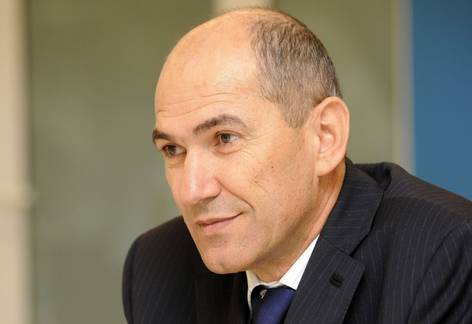NEWS
Prime Minister Janez Janša: "In order to help Slovenia's economy grow again, we must first stop suffocating it."
In an interview for Ognjišče radio station, the Prime Minister of the Republic of Slovenia, Janez Janša, talked about the measures adopted by the Government to overcome the economic crisis and achieve fiscal consolidation, the stimulation of economic growth, potential amendments to the Slovenian Constitution through the introduction of the golden fiscal rule, the plans in place to reduce unemployment, and the reforms to be adopted by Slovenia in the future. He also mentioned the Statehood Day ceremony, the situation in the coalition and the opposition, and the forthcoming presidential election.
When addressing the introduction of the golden fiscal rule into the Constitution and the changes to the referendum arrangements, the Prime Minister explained that while all the parliamentary parties had initially expressed their support for these changes, some changed their minds afterwards. The governing coalition will nevertheless propose a vote on these two issues at the National Assembly, as the adoption of both would serve as an important signal by the state to external markets. In the Prime Minister's view, the outcome of this vote is crucial because "the resolution of these two issues largely depends on whether we, the Slovenian people, will remain capable of rescuing Slovenia from the economic crisis ourselves or whether we will have to comply with conditions set by others". The Prime Minister also took the view that unless at least one opposition party shows a minimum level of responsibility in this vote, Slovenia may face a rescue scenario similar to what we are currently witnessing in Cyprus and Spain. "If we have to postpone these decisions or wait for a two-thirds majority until 2015, as proposed by Mr Janković's party, we will face the Greek scenario," the Prime Minister said, before adding that the government is doing everything in its power to prevent this from happening; the July session of the National Assembly, which is when this will be decided, is therefore "Slovenia's moment of truth". The Prime Minister stressed that "ever since its independence, Slovenia has never before encountered such a critical situation. And this situation, of course, calls for the adoption of instruments through which we can address this situation."
As for the Fiscal Balance Act, the Prime Minister said that this had given Slovenia a few extra months to adopt other measures while functioning more or less normally. "If this Act had not been adopted, the funds required for the functioning of several state systems and sub-systems would simply run out by autumn," he said. He rejected the allegations made that retirement pensions were lower because of this Act, as it had no bearing in this regard.
The Prime Minister went on to speak about the measures in place to give renewed impetus to the economy. He noted that the government had prepared most of the legislation, or a package for growth, which contains measures to help the Slovenian economy in the coming months and years, and facilitate the gradual creation of new jobs. "Each new job is sign that we are exiting the crisis," the Prime Minister stressed. In his opinion, economic activity in Slovenia is expected to experience a revival at the end of next year; new jobs will be created, unemployment will fall, and employment will rise, which will, "of course, also replenish the public budget".
The Prime Minister also said that the government is currently focused on regulating the chaotic state asset management system and rehabilitating the Slovenian banking system in order to help it meet the criteria set by the European Central Bank.
The Prime Minister also touched on the changes to the health care and education systems. The aim of the changes to the health care system is to provide the maximum possible level of quality of – and accessibility to – health care services with the funds available. "It will always remain impossible, however, to provide enough funding for all the needs in this field, not only because of population ageing, but also because the growth in unemployment and the drop in employment reduce health budget inflows," the Prime Minister explained. As regards the measures in the field of education field, the Prime Minister said that the competent ministry had carried out the streamlining of the secondary school network in a way that had not brought about any changes for students, while "some programmes otherwise destined to die out because of low potential can therefore survive and grow because the streamlining carried out will allow for this possibility".
The Prime Minister's idea of the President of the Republic is "a person who stresses unity and integration – a person who actually supports what the country and its citizens need". In his opinion, the President of the Republic may not participate in day-to-day politics, or have double standards, and must, above all, be a person who can empathise with his or her fellow citizens.





